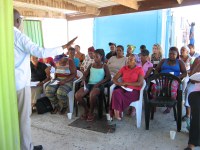CLC conducts a human rights workshop in Blikkiesdorp
The objective of the training was two folds:
1. to empower people in informal settlement to assert their rights as enshrined in the Bill of Rights of the South African Constitution.
2. to empower participants with relevant information on how to engage with government institutions at the local, municipal and national level as well as chapter 9 institutions such as the South African Human Rights Commission (SAHRC), Commissioner for Gender Equality (CGE), Office of the Public Protector, with a view to realising their socioeconomic rights.
Twenty years into democracy a significant number of South Africans are yet to benefit from the dividends of democracy. Experience has shown that vulnerable groups such as women and children that live in informal settlements do not yet enjoy the quality of life that the constitution envisages for all. Although the constitution guarantees various forms of socio-economic rights including housing health and social security, however in reality, these rights have not been realised. Access to basic social amenities such as housing health, water and sanitation remains a pipedream for majority of people living in informal settlements.
According to Dr. Ebenezer Durojaye, ‘SERP’s experience working with people in informal settlements has revealed that, despite the large scale violation of their socio-economic rights most of them are unable to engage with the relevant government institutions and chapter 9 institutions either to assert their rights or to register their complaints. This has further aggravated the poverty situation in informal settlements. It is important to note that unless people are aware of their rights and be able to engage with relevant institutions, human rights abuse in general and socio-economic rights deprivation in particular will continue without redress.’
Gladys Mirugi-Mukundi noted that housing /shelter is important ‘as it is a place to eat; sleep; relax and raise a family’. Housing therefore is an important aspect of human survival. She elaborated on section 26(1) of the Constitution, which provides that everyone shall have the right of access to adequate housing. She asserted that accessibility means that the State must create conducive conditions for all its citizens, irrespective of their economic status, to access affordable housing. This means that all the three different spheres of government have a responsibility in ensuring that the right to access adequate housing is fulfilled, with particular attention on local government, which is responsible for service delivery at a local level.
Soraya Beukes further clarified that just as human rights are indivisible and interdependent, so is the right to access adequate housing. Right to access adequate housing is not a stand-alone right, it incorporates other rights such right to water and sanitation, right to health among other human rights.
Ms Kelly Stone, of the SAHRC, informed to the community members on how to lodge complaints with the South African Human Rights Commission (SAHRC). The South African Human Rights Commission has a mandate set out by the Promotion of Access to Information Act (PAIA), to promote the right to access information and monitor compliance with the legislation. A PAIA application is a formal request for information from a public body.
One of the participants, Ms Matilda Groepe shared her experience, where she together with other Blikkiesdorp community members assisted by the Right2Know campaign , submitted a PAIA application requesting for information on how temporal was Blikkiesdorp temporal area is, since she has lived there for more than six years now. In response the City of Cape Town sent her a huge packet of documents that she could not comprehend.
Kelly emphasised that once a PAIA application has been lodged, public body must respond to the request within 30 days. PAIA is the only freedom of information legislation that permits access to records held by private bodies.
At the end, most of the participants were happy and said that for the first time their constitutional rights have been fully explained to them in a simple and clear language. They found the training empowering and expressed their appreciation. Councillor C Esau of the City of Cape Town expressed his gratitude on behalf of the community and was similarly happy about what Community Law Centre is doing and requested that similarly human rights workshops be conducted in other wards in Delft area.

